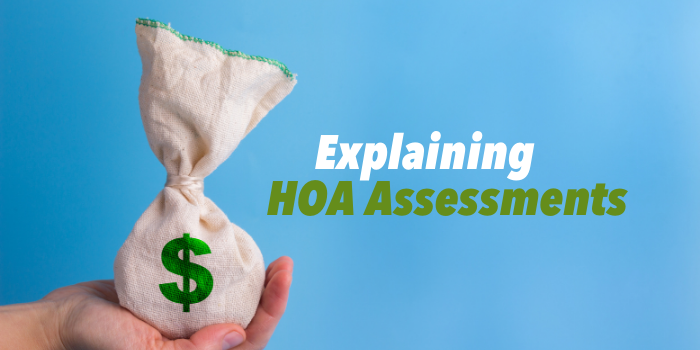Explaining HOA Assessments to Homeowners
As our partner, we want to help you set your community and homeowners up for success. Timely and effective communication regarding assessments is one important way to get each year started on the right foot.
As you are aware, payments collected from homeowners to cover expenses in the association are known as assessment fees, or dues. Because HOA assessments are vital to the overall health of the association, members are responsible for paying assessments in a timely manner.
By understanding the basic concept of the HOA annual budget and why assessments are important, the board can help members understand what assessments are, and also when (and why) assessments may increase on occasion.
Board Responsibilities
The HOA board is essentially responsible for coordination and payment of the operation, maintenance, repair, and replacement expenses associated with all common areas in the community. These expenses vary from community to community, but may include items such as pool maintenance, landscaping, and utility bills for a clubhouse or gym.
The Annual Budget
The board adopts an annual budget which includes the costs of all ongoing maintenance and operational expenses, plus an additional amount set aside in a reserve fund. This amount is divided between each homeowner in the community, which is then paid to the HOA periodically in the form of HOA assessments.
Assessment Increases
Board members pay association assessments just like everyone else, and they are working to ensure funds are used effectively and efficiently. Therefore, it is reasonable to assume that the board will not vote to increase assessments unless it has been well researched, planned, and deemed absolutely necessary. However, due to inflation, the HOA budget generally increases each year, which results in increased assessments.
How Much Can Assessments Increase?
In general, the association’s CC&Rs contain limitations on how much the HOA can increase assessments. For instance, many associations limit assessment increases to 2% per year, or to a maximum dollar amount per year. Though the HOA can generally raise assessments as often as needed to meet the annual budget, there are always rules that must be followed and conditions that must be met.
Special Assessments
Occasionally, urgent needs will arise that do not fall under the planned budget, which leaves the board no choice but to impose a special assessment. In this case, the HOA may vote to collect a special assessment from each owner to fund the expense. The levying of special assessments is generally regulated by the HOA’s governing documents. The CC&Rs will dictate when and how special assessments are implemented.
Unpaid Assessments
The HOA relies on all members paying their assessments in full and on time to have enough money to fund the various projects and amenities that the association in responsible for. If even one member of the association doesn’t pay their dues, the budget falls short. If multiple members neglect their assessments, money may fall into such short supply it forces the association to levy special assessments to make up the difference, which is unfair to the majority of the members to have to make up for the neglect of a few members!
The board can always consult with their management company and accountant to ensure they are making wise financial decisions and getting the most out of both annual and special assessments.
By educating homeowners on the assessment process, the HOA board may decrease the amount of unpaid assessments and the need for special assessments in the future.







